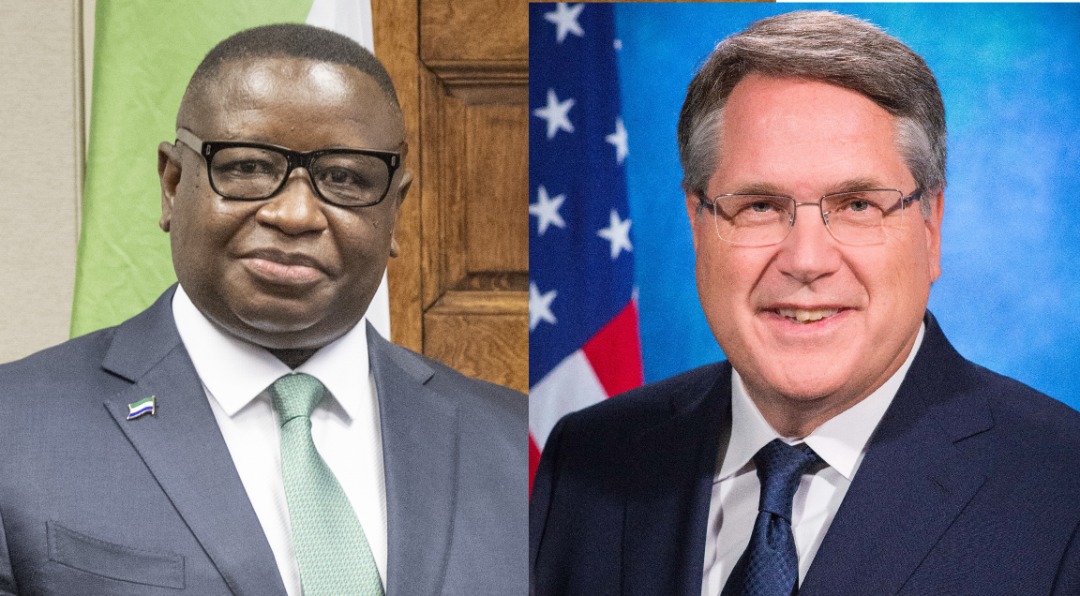By 2006, relationship between the Tejan Kabbah led SLPP Government and Her Majesty’s Government had deteriorated sharply. Kabbah’s refusal to extend the tenure of Val Collier as ACC Commissioner made matters worse. The UK Government wanted Val Collier to continue in his role as Commissioner of ACC (Anti-Corruption Commissioner) against the will of the Kabbah Government.
When Val Collier’s first-term tenure ended, Kabbah wasted no time in appointing a Law Professor, Henry Joko-Smart, as ACC Commissioner. The APC wrote a secret letter to the UK Secretary of State for International Development, Hilary Benn, complaining that, Prof. Joko-Smart was Kabbah’s brother-in-law. Prof. Joko Smart’s appointment as ACC Commissioner strained relationships between the Kabbah Government and Her Majesty’s Government. The UK Government threatened to withdraw financial and technical support from the ACC if Kabbah insisted on having Prof. Henry Joko-Smart as Commissioner of the ACC.
At a donor’s conference in London, co-chaired by Hilary Benn and Momodu Koroma (Kabbah’s Foreign Minister), the appointment of Joko-Smart dominated the early morning session of the conference. The APC had mobilized their supporters outside of the conference hall in London to denounce corruption in Sierra Leone. Kabbah instructed Momodu Koroma to use his influence in the UK Government to convince them to allow the appointment of Prof. Joko-Smart to stand.
Kabbah had refused an official request by the UK Government to charge Okere Adams to court for allegedly influencing the award of a contract in the Ministry of Marine Resources to a senior member of the SLPP.
Val Collier’s decision to order the arrest of Okere Adams embarrassed Kabbah a great deal. Okere Adams was Kabbah’s blue-eyed boy. He was treated by Kabbah with special favour.
Because of the refusal of the Kabbah Government to remove the fiat for Okere Adams to be charged to court, the UK Government decided to slash £5M from the UK budget support to Sierra Leone.
Momodu Koroma was very instrumental in getting the UK Government to continue to support Sierra Leone’s fragile economy. Momodu Koroma engaged in regular diplomatic shuttles between Freetown and London in order to keep the UK Government on side.
By the time Kabbah left office in 2007, he was barely on speaking terms with the UN Special Representative of the Secretary General (SRSG) Jose Victor Angelo.
Kabbah’s differences with the UK Government and the UN Country Office in Sierra Leone were resolved through quiet diplomacy.
𝐔𝐒 𝐕𝐢𝐬𝐚 𝐑𝐞𝐬𝐭𝐫𝐢𝐜𝐭𝐢𝐨𝐧
Last week, the United States announced a new visa restriction policy affecting those “believed to be responsible for, or complicit in, undermining democracy in Sierra Leone, including through the manipulation or rigging of the electoral process, intimidation of voters, election observers, or civil society organizations through threats or acts of physical violence; or the abuse or violation of related human rights in Sierra Leone. Family members of such persons may also be subject to these restrictions”. Nobody in the Sierra Leone Government appears to know the identity of the people affected by this new visa restriction policy.
The people specifically targeted by this new visa restriction policy would have their US visas revoked if they already have a valid one.
This open-ended US visa restriction should be properly explained by the US Embassy in Freetown. This visa restriction is expected to be in force for as long as the US Government wishes.
According to a US Embassy spokeswoman in Freetown, additional names would be added to the list of names they have already prepared if new evidence of complicity in rigging the June 24 elections emerges.
𝐓𝐨𝐧𝐞 𝐃𝐨𝐰𝐧 𝐓𝐡𝐞 𝐑𝐡𝐞𝐭𝐨𝐫𝐢𝐜
Some people in the Government should be stopped from making any further public comments on this matter. Let us tone down the rhetoric and allow the President to handle it. He is the best person to handle such matters.
It has to be said that, at the end of the day, the Sierra Leone Government stands to lose in a big way if they pick up an open fight with the US Government. The US has great influence over decisions taken by the Bretton Wood Institutions including the IMF and the World Bank.
Whether one likes it or not, the country is going through difficult challenges. In order to stay as an IMF program country, we have taken very difficult and painful decisions like the removal of subsidy. That is affecting our people greatly.
It is sad that we have reached a point where domestic debts owed by the Government are now being settled through the issuance of treasury bonds.
I feel sorry for President Bio. I believe that, he genuinely won the Presidential election of June 24 on a first ballot. The problem he has is that, some of his communications handlers and Ambassadors have not been able to convince the doubting Thomases that the elections have been decided and a winner has been declared.
The long and short of it all is that, we must tone down the rhetoric and allow the President to engage in his usual quiet diplomacy to handle this complex issue the way he handled the Yenga crisis in March this year. Sometimes, complex issues are handled through discreet negotiations or actions.
President Bio should consider the idea of setting up an Advisory Council in his office at State House. That council should be made up of eminent citizens who have served this country with distinction no matter their political party affiliations. In politics, difficult decisions are meant to be taken. Let the interests of the country prevail over individual egos! The interests of the nation as a whole are bigger and far more important than any individual interest in this country.
May common sense prevail!


 8 Comments
8 Comments









Comment(s)
Disclaimer: Comments expressed here do not reflect the opinions of Sierraloaded or any employee thereof.